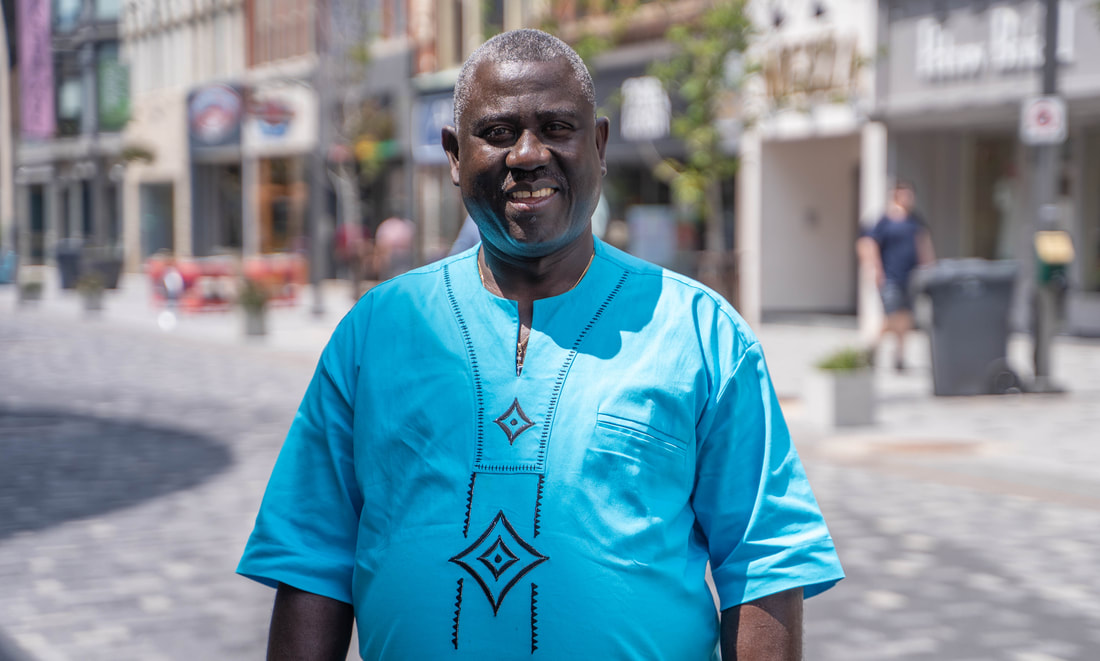Francis Hinnah: "Don’t be afraid to start from the bottom. Starting from the bottom means you will get to the top.”
“I did not choose London, London chose me.”
That’s how Francis J. Hinnah responds when he’s asked about how he and his family ended up in 2005 in the Forest City after spending 10 years in a refugee camp after fleeing the civil war that erupted in his home country of Liberia.
Growing up in Liberia, a West African country of about five million people, Francis says he was raised by a village.
By that, he means that every adult was like a parent to the children of the village, “with the absolute right to discipline the children.”
“Until the Civil War that started in 1989, we had a pleasant and beautiful life,” he says.
The war, which left an estimated 250,000 people dead, also displaced hundreds of thousands of Liberians, including Francis and his family who fled initially to neighbouring Ivory Coast, and later to a United Nations-run refugee camp in Ghana.
While at the Ghana camp, Francis volunteered with the UN High Commission for Refugees, where his efforts to better the lives of the refugees brought him into close contact with Mr. Thomas Albrecht and Mr. Antonio Guterres, the UN’s secretary general.
Just before he left Liberia, Francis worked for the Liberian government as part of the ministry in charge of Rural Development, which was tasked with building roads, markets and wells, among other infrastructure projects across the country.
Despite his vast experience, Francis had to start again from the bottom when he arrived in Canada, an experience shared by many newcomers.
“My credentials were from Africa,” he says. “Even in the refugee camps my credentials were recognized, but that all changed when I came to Canada”.
That’s how Francis J. Hinnah responds when he’s asked about how he and his family ended up in 2005 in the Forest City after spending 10 years in a refugee camp after fleeing the civil war that erupted in his home country of Liberia.
Growing up in Liberia, a West African country of about five million people, Francis says he was raised by a village.
By that, he means that every adult was like a parent to the children of the village, “with the absolute right to discipline the children.”
“Until the Civil War that started in 1989, we had a pleasant and beautiful life,” he says.
The war, which left an estimated 250,000 people dead, also displaced hundreds of thousands of Liberians, including Francis and his family who fled initially to neighbouring Ivory Coast, and later to a United Nations-run refugee camp in Ghana.
While at the Ghana camp, Francis volunteered with the UN High Commission for Refugees, where his efforts to better the lives of the refugees brought him into close contact with Mr. Thomas Albrecht and Mr. Antonio Guterres, the UN’s secretary general.
Just before he left Liberia, Francis worked for the Liberian government as part of the ministry in charge of Rural Development, which was tasked with building roads, markets and wells, among other infrastructure projects across the country.
Despite his vast experience, Francis had to start again from the bottom when he arrived in Canada, an experience shared by many newcomers.
“My credentials were from Africa,” he says. “Even in the refugee camps my credentials were recognized, but that all changed when I came to Canada”.
Francis says it was hard to transition from being a respected government worker, to a refugee, to then start all over again in Canada.
But it was a test he embraced.
“It was a challenge, but now I tell all newcomers, ‘Don’t be afraid to start from the bottom. Starting from the bottom means you will get to the top.”
A public administrator today with a degree from Western University, Francis is the records manager co-ordinator for Huron County.
He’s also involved in promoting education, sports and community engagement among immigrants.
“I volunteer with several community organizations in London,” Francis says .”My focus has always been on helping newcomers settle and feel welcome in the London community.”
His life experiences have also taught him that absolutely nothing is permanent, but every change is an opportunity to do better.
Francis believes that it is important to re-educate refugees to develop skill sets that are practical and useful for when they get to leave the camps.
“It’s not enough to pat them on the back and tell them that everything will be fine,” Francis says.
“It's important to give them, in a practical sense, something to look forward to – hope for a better life”.
His message is particularly poignant this year, as the 2023 World Refugee Day theme is “Hope away from home.”
But it was a test he embraced.
“It was a challenge, but now I tell all newcomers, ‘Don’t be afraid to start from the bottom. Starting from the bottom means you will get to the top.”
A public administrator today with a degree from Western University, Francis is the records manager co-ordinator for Huron County.
He’s also involved in promoting education, sports and community engagement among immigrants.
“I volunteer with several community organizations in London,” Francis says .”My focus has always been on helping newcomers settle and feel welcome in the London community.”
His life experiences have also taught him that absolutely nothing is permanent, but every change is an opportunity to do better.
Francis believes that it is important to re-educate refugees to develop skill sets that are practical and useful for when they get to leave the camps.
“It’s not enough to pat them on the back and tell them that everything will be fine,” Francis says.
“It's important to give them, in a practical sense, something to look forward to – hope for a better life”.
His message is particularly poignant this year, as the 2023 World Refugee Day theme is “Hope away from home.”
